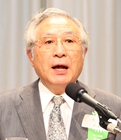��New Generation Month�� Meeting
Future of Japan, Future of Education
September 12, 2012
Mr. Tetsuo Tamura
Chairperson of the Board of Trustees, Gakko Hojin Shibuya Kyoiku Gakuen
 ��I want to call to your attention the two recent news articles related to ��the future of young people.��
��I want to call to your attention the two recent news articles related to ��the future of young people.��
��The first article reported that the new President of France, Francois Hollande, elected amidst the economic turmoil in Europe, started his term in office with a homage to Jules Ferry (1832-1893). Although not much is known about Jules Ferry in Japan, he separated education from religion and is seen as the father of compulsory education in France. Ferry also made a historic achievement of promoting education for girls. I was deeply impressed as the new President entrusted to overcome economic crisis referred to education in his homage.
��The second article ��The Real Wealth of Nations�� appeared in The Economist on June 30. We all know that ��The Wealth of Nations�� was written by Adam Smith in 1776, which advocated for the free market economy. Our society has evolved around this economic mechanism believed to be the best. The article refers to a thesis entitled ��The Real Wealth of Nations�� written by Sir Partha Dasgupta of Cambridge University which questions the validity of ��gauging an economy by its GDP, which takes into account only the flow of goods and services, not the stock of assets.�� The thesis suggests to take a comprehensive approach and to sum up the following components of assets:
1. Manufactured or Physical capital (material goods and manufactured products)
2. Human capital (population, education or skills)
3. Natural capital (land, forests, fossil fuels or minerals).
��By this gauge, America��s wealth ranks the top. When it comes to wealth per capita, however, Japan is No 1 by far. While our natural resources are small, our human resources and manufactured resources are enormous.
��The Japanese must be more confident as Japan still has a prominent presence in the world. I believe ��education�� serves as an impetus to our nation. Determination to build on our human resources will bring a promising future. In the early Meiji era, one third of our national budget was allocated for education which became the driving force towards prosperity in later years.
��Let me quote the teachings given by Yukichi Fukuzawa in discussing the future of education and future of Japan. Fukuzawa once stated, ��A scholar should be the ��guardian goose�� of society.�� Geese make seasonal migration, thus Fukuzawa chose this bird to refer to knowledge dissemination. The ��guardian goose�� watches for danger while the rest of the flock is focused intently on pecking their food.
��Today, we live in a totally different world from Fukuzawa��s days. Thanks to democracy, we have become much more affluent and have access to massive amount of knowledge. Many people are highly-educated. Every person is endowed with equal opportunity in a democratic society, based on the principle that each of us would pursue ��happiness.�� ��Happiness�� allows diverse interpretations, and it is likely to become even more diversified. Yet I believe the right to ��decide one��s own affairs�� is the underlying condition of happiness. Education empowers us to make our own decision. Education will become highly advanced, and I predict that people in every society will come to seek opportunities to enroll in higher educational institutions. I am concerned that Japan seems to overlook this trend, thus we need a ��guardian goose�� to revitalize our society.
��I must admit the Japanese people lead their daily lives somewhat detached from the massive changes unfolding in other parts of the world. For example, young people are becoming increasingly inward-looking amidst the dynamic global advancement. Concrete measures are yet to be taken. Giving you some figures, the number of Japanese students studying in the US is falling every year, from 47,000 in 2000 down to 29,000 in 2008. Percentage of enrollment in higher education in Japan remains modest at 44%, while that of Australia being 85%, Latvia 97%, Norway 79% and the US 62%. In 1918, the mission of higher education in the US was stipulated ��to educate students to be good and democratic citizens.�� Tireless efforts by American universities have placed 8 of them in the top 10 world university rankings.
��Increasing number of incidents related to ��bullying�� is another urgent issue to be addressed in Japan. We must try not to trap children in a closed society. Providing various venues for children to gather outside schools, and to nurture individuality can be a part of the solution.
��Education in the coming years must focus on how to cultivate individual potentiality by giving careful consideration to his/her process of growth. Specialists from various fields, not necessarily related to education, must be encouraged to get engaged in the sound upbringing of youth.
��Before closing, let me share with you the initiative taken by ACCU (Asia-Pacific Cultural Centre for UNESCO). ACCU was established in Tokyo, to promote mutual understanding and cultural cooperation among peoples in the Asia-Pacific region. Every year, high school students participate in the ��Model UN Conference.�� Students of that age become conscious of their individual character and independent-minded, and start to explore future course to be taken. Many Japanese students who participated in the conference were shocked to find out their arguments were not convincing at all. This is because Japanese schools do not teach and train students to become a persuasive speaker. They must be given opportunities to make presentations based on logical thinking in the future.
��I am concerned about the future of this country. We enjoy an affluent life today, thanks to the efforts made by our forerunners in the Meiji era. Time has come for us to play the same role for the generations to come.